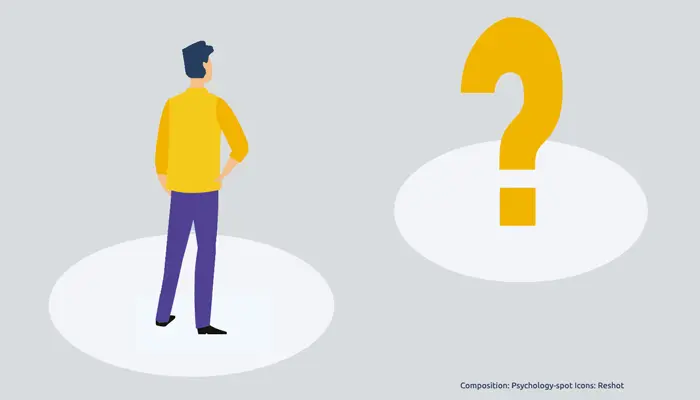
Doubting everything. That could be the maxim that characterizes the times in which we live. Times in which the power of the referent seems to be diluted in a relativistic post-truth.
It is nothing new. Descartes systematized the doubt with his “I think, therefore I am.” Long before, skeptical philosophers had already embraced doubt and much later, Nietzsche himself said that “every conviction is a prison.”
As a tool in the search for truth, doubt is very useful. But maybe we are applying it wrong. Perhaps the doubt is getting out of hand. Perhaps the act of doubting – half applied – is creating more problems than it solves in our lives and in our society.
Sacrificing wisdom on the altar of intelligence
“Our society fosters intelligence rather than wisdom and celebrates the most superficial, hostile, and useless aspects of that intelligence,” wrote Tibetan Buddhist teacher Sogyal Rinpoche. “We have become so falsely ‘refined’ and neurotic that we take our own doubt for truth, and thus doubt, which is nothing more than a desperate attempt by the ego to defend itself against wisdom, remains deified as an objective and the fruit of authentic knowledge”.
“Contemporary education indoctrinates us in the glorification of doubt and in fact has created what could almost be called a religion or a theology of doubt, in which to be considered intelligent it is necessary to show that everything is doubted, always pointing out what is wrong and rarely ask what is right, cynically denigrate inherited ideals and, in general, everything that is done out of simple goodwill”.
According to Sogyal Rinpoche, this type of doubt is destructive because it ends up being “A sterile addiction to contradiction that repeatedly robs us of any true openness to any broader and more ennobling truth.” In practice, doubting for doubting, because we think it is a sign of intelligence, could simply plunge us into the most absolute mental chaos, leaving us in the clutches of an ignorant relativism that does not allow us to move forward but often implies a setback.
The noble doubt involves questioning ourselves
We are a society that praises doubt but is incapable of doubting itself and the questioning process. By doubting everything outside, without looking inside, we end up entangled in social conditioning that ends up dictating the path of “truth”. That path, however, does not lead to wisdom.
In practice, we doubt everything external. We doubt that the earth is round, the existence of a virus, statistics, what power figures say, what newspapers write, what doctors and volcanologists say … And that’s fine. Questioning things and not taking them for granted is important.
But we also have to question ourselves. We have to question the thought process that leads us to draw some conclusions and not others. Above all, we have to question our expectations throughout that process. The beliefs and stereotypes that are at the bottom and that end up pushing us in a direction that might not be the most appropriate.
In contrast to the nihilistic doubt, Sogyal Rinpoche proposes a “noble doubt”. “Instead of doubting things, why don’t we doubt ourselves: our ignorance, our assumption that we already understand everything, our grasping and avoidance, our passion for supposed explanations of reality that are found completely devoid of that wisdom,” he proposes.
“That kind of noble doubt stimulates us, inspires us, tests us, makes us more and more authentic, empowers us and draws us further inward,” said Sogyal Rinpoche.
Obviously, the path to embrace the doubt that leads to wisdom is full of obstacles in these times: lack of time, dispersion, the overabundance of stimuli that prevent us from concentrating on the questions and our questioning, as well as the information overload. They are barriers that hinder the possibility of seeking answers within us.
Sogyal Rinpoche proposes another way: “Let us not take doubts with excessive seriousness or let them grow disproportionately; Let’s not see them only in black and white or react to them with fanaticism. What we have to learn is to gradually change our concept of passionate and culturally conditioned doubt for one that is more free, humorous and compassionate. This means that we must give time to doubts, and give ourselves time to find answers that are not merely intellectual, but live, real, authentic and operative.
“Doubts cannot resolve themselves immediately, but with patience we can create a space within ourselves where doubts can be carefully and objectively examined, unraveled, dissolved, and healed. What we lack, especially in our culture, is the correct mental environment, richly spacious and free from distraction, in which intuitions can have the opportunity to mature slowly”.
Sogyal Rinpoche does not say that we do not question the world. He is saying that we dare to question it free of stereotypes and conditioning in order to arrive at a truly sincere and authentic answer. He tells us that questioning must also extend to our thought process, our reasons for doubting and, above all, to conclusions.
Without that attitude, the pleasure of thinking is lost. Questioning, doubting and suspecting generates pleasure in feeling that through this act one becomes more and more free and autonomous. By doubting we become a person more in control of his life who decides who he is, what he does and why. However, if we do not allow ourselves to doubt ourselves and simply align ourselves with the answers provided by the other dissident part of society, we are giving up wisdom to plunge into the chaos of sterile doubts. We leave one flock to join another. And that is not intelligence or wisdom.
Source:
Rimpoché, S. (2015) El libro tibetano de la vida y de la muerte. Barcelona: Ediciones Urano.



